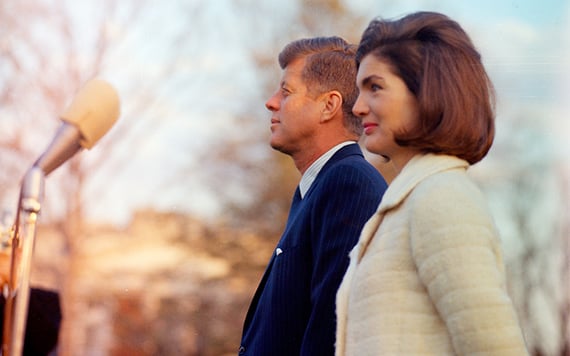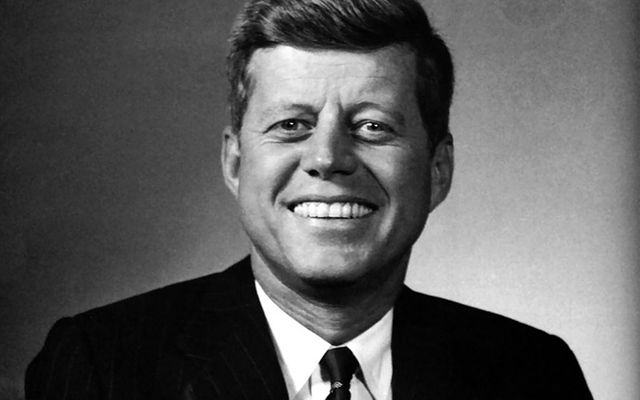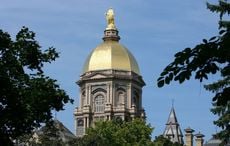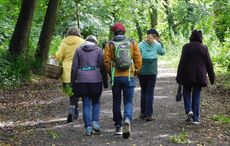Today is President Kennedy’s 100th birthday. He could still be alive -- imagine that! His mother lived to 104, his sister Jean is hale and hearty at 89 and just wrote a book.
For young Irish of his generation and younger JFK was the North Star, the glamorous, brilliant politician who shook Irish America out of its defensive crouch and made it a wildly desired ethnicity. Out with the “No Irish Need Apply”signs, in with “All the Way With JFK.”
I grew up in North Greenwich Village in New York City, an immigrant from Dublin. This was the really gritty part of the Village. The docks were still active and the High Line, now a park, was a running railroad, moving meat and vegetables from the docks uptown down to the Village and the Washington Market even more downtown.
I went to St. Bernard’s Parochial School on West 13th Street. This parish was formed in 1867 because of the many Irish longshoremen, many of them survivors of the Great Famine, who worked on the New York docks.
To put it mildly, this was a partisan Irish neighborhood.
But we were not alone. There was also a great deal of Italians and Hispanics, mostly Puerto Ricans. But the majority at St. Bernard’s students bore Irish names like Crowley, Dillon, Gallagher, Cleary, Walsh, Cavanaugh, Sullivan and Delaney. At the age of seven, my best friend in the neighborhood was a Protestant, Charlie Diaz. In fact, in all the surrounding tenements, he’s the only Protestant I knew. We had only one lone Jew, a little fellow by the name of Fisher. When he was surrounded by all the Irish kids on the block and told us he was Jewish we all stood back in awe—the only Jew we ever met! We were Irish, the scrappy underdogs, but nowhere near the top of the heap.
Then the magical year of 1960 happened. All of a sudden, there was this guy with an Irish name, Kennedy. And what’s more, he was a Catholic just like us! Of course, he wasn’t like us at all. He was handsome and rich.
Read more: Jackie believed Lyndon B. Johnson had John F. Kennedy killed
Unlike all the kids on West 13th and Gansevoort Streets we knew he never had the knees of his dungarees patched even once in his life. But we liked the idea that he had dough because his family proved that you could make it in America.
The American Dream was almost gospel to Americans back then and a family like the Kennedy, just in the country for a century, proved it. He even made fun of his wealth, once telling an audience: “I just received the following wire from my generous Daddy: Dear Jack, don’t buy a single vote more than is necessary. I’ll be damned if I’m going to pay for a landslide.”
Rich and all, he was still one of us. He gave great speeches and more important he had a great Irish sense of humor. Nearly sixty years later I can still remember some of his adlib lines from the 1960 campaign.
After Kennedy would visit a city the Republicans would send in a “Truth Squad” to tell their side of the story. Towards the end of the campaign, with money tight, the GOP withdrew their veracity troops. When asked why they had done this, JFK simply replied, “They told the truth!”
And just before the election former Governor Thomas Dewey, the man who blew the 1948 election to Truman, flew in to advise Nixon. “He’s going to tell him how to win the close ones,” quipped Senator Kennedy.

Senator JFK, photographed in 1957.
I remember inauguration day, Monday, January 20, 1961. We had the day off from school. The nuns said it was so they could have a teacher’s conference, but we all knew it was because they wanted to sit back and watch the first Irish-Catholic President of the United States being inaugurated. Little did I know those words—“Ask not what your country can do for you. Ask what you can do for your country.”—would be burnt into my brain forever. We, the Irish, had come a long way from the famine and the day of the Know-Nothings.
I remember one of the treats of getting home from school at three o’clock was that the President held his press conferences in the afternoon. These became must-watch episodes because of the way JFK handled the press.
He did it with flair, intellect and, of course, that special humor. Unlike one of his successors, he did not moan about witch-hunts—although he once threatened to cancel his subscription to the New York Herald Tribune because of their negative editorials, but never did—and when he screwed up, bigly as they would say today, at the Bay of Pigs in 1961 he took his medicine, declaring: “Victory has a thousand fathers, but defeat is an orphan.”
Watch The Wit of JFK:
His ease with words, his ease with himself, either talking about presidential imitator Vaughan Meader—he thought Meader’s imitation of him sounded more like brother Teddy—or a chimpanzee in space, made for fantastic TV.
Hear Vaughan Meader’s The First Family:
Along about this time came another group of Irish to be cherished, the Clancy Brothers and Tommy Makem. One of President Kennedy’s birthday celebrations—no, not that one with Marilyn Monroe—was on television and the Clancys & Makem were one of the featured acts. Introduced by actor Robert Preston, Liam Clancy offered up a humble tribute to the President which elicited a big smile from JFK. Then they went on to sing “We Want No Irish Here,”
reminding us of the not too distant American nativist past, which has once again been resurrected by certain Americans, some of whom make like their people came over Business Class on the coffin ships.
The early ’60s, especially to a small boy, were a time of terror. There was chaos in Berlin, Soviet Sputniks over American skies, noise from faraway places with funny names like Laos, the Congo and Vietnam. And the home front was also on fire with the beginning of the civil rights movement with Freedom Riders and Martin Luther King’s March on Washington.
The most terrifying thing you could see on your television screen back then was when your favorite show, Zorro, was interrupted with one word on the screen:
BULLETIN!
It was terrifying. What had happened? Were the missiles on the way? It almost sounds like a joke today, but back then, they had us sitting under tables in the basement of St. Bernard’s, obviously, a sure-fire way to survive the ICBM that just smoked the whole of Manhattan island.
But like a true hero, Kennedy also educated.
I remember the terror I personally felt in October 1962 during the Cuban Missile Crisis. We really wondered when we went off to St. Bernard’s in the morning if we’d make it home for lunch. You could almost feel the relief in the great, big City of New York when the crisis ended. But you had faith in the young president and knew he’d do the right thing, giving you a chance to pursue your American Dream.
June 1963
I still remember his civil rights speech on June 11, 1963. I was in a car on the Long Island Expressway coming home from a friend’s house and the rock music on WABC-Radio was interrupted for the President’s speech. I still remember what stuck with me:
“We are confronted primarily with a moral issue,” spoke the President. “It is as old as the Scriptures and is as clear as the American Constitution. The heart of the question is whether all Americans are to be afforded equal rights and equal opportunities, whether we are going to treat our fellow Americans as we want to be treated....
It all sounded so logical. It’s exactly what the nuns at St. Bernard’s had been teaching us. We had been taught about what was right and wrong and clearly what was happening to black Americans was wrong. Why couldn’t people do what was right? It would take the back of President Kennedy’s head being blown off to help nudge the nation in the right direction.
See JFK’s civil rights speech here:
After the Civil Rights speech the president was off to Berlin where he gave his “Ich bin ein Berliner” speech. Even then his famous wit showed through when he said: “I appreciate my interpreter translating my German,” which got a roar out of the crowd. My brother had served in the army in Germany so I knew how important Germany was to the safety of America. Here was the President of the United States lifting up a people, telling them that we Americans had their back, and that they would outlast the Communists. And you know what? He was right on.
Here JFK’s “Ich bin ein Berliner” Speech here:
After Berlin Kennedy was off to Ireland. This was watched with interest in the family, especially by my mother, a girl from Camden Street in Dublin. She had not been back to Ireland since she left in 1954 and she was like an excited schoolgirl as she pointed out the streets to me as the president’s motorcade rolled along. “That’s O’Connell Street and that’s the GPO and Nelson’s Pillar. And there’s Dan O’Connell. There’s the front of Trinity College and they are going up Dame Street now. And look at ould Dev beside him!”
Of course, I had no idea of what the GPO or Nelson’s Pillar was. I just knew Dev was this old guy that my father was always talking about, not always with great love. My only real memory of Dublin was as a very small child coming out of D’Olier Street and crossing O’Connell Bridge where I realized that the balusters were bigger than I was.
Kennedy’s visit was my introduction back into Ireland. By the time I returned to Dublin in 1971 I would know these same streets by memory from studying them on maps. My education into Irish revolutionary politics had begun.
See President Kennedy in Ireland:
November 22, 1963
There are four days that are highlighted in my mind: the days my parents died, 9/11, and November 22, 1963. But that Friday still sticks out in my mind like no other day in my life.
It was a beautiful day, not too cold for November, and with a bright blue sky not bothered by one cloud. Everything was normal in my 7th grade class until just after lunch. Then the principal came over the PA system and announced that the president had been shot and that he was in critical condition. A few minutes later she came back to tell us President Kennedy was dead. We were all stunned. It was the quietest the class had been all year.
“You better all pray,” said Sister Stanislaus, “that the commies don’t take over!” With that admonition in mind we were dismissed. I remember crossing 8th Avenue and looking up at the big Port Authority Building on 15th Street and seeing that the Stars & Stripes were still flying at full-staff. I was appalled that someone didn’t honor the dead president by bringing down the flag to half-staff.
My mother and father were very upset that Friday evening and there was more dread on TV as the president’s coffin was awkwardly lowered down the steps of Air Force One. There was Jackie, the president’s blood still on her pink dress, and Bobby Kennedy too. Then the new president, Johnson, said a few words.

Happier times: John F Kennedy and his wife Jackie.
The misery of the nation played out over the next several days. Lee Harvey Oswald was shot right in front of us on TV and there was the funeral mass with Cardinal Cushing presiding. Then there was little John-John saluting his daddy’s coffin. And I again spotted President de Valera and thought how this old president was still marching on and the young president was dead. As JFK once said, “Life is unfair,” especially on this sad day.
What we didn’t know then is that this terrible weekend was the beginning of the Great American Reality Show, which would show the American nation work out its’ terrible neuroses live on national television in senseless wars, more assassinations, and acts of unbelievable pettiness and meanness. It was the beginning of the loss of decency in America.
Happy Birthday, Mr. President
But today, on John F. Kennedy’s 100th birthday, I prefer to remember only the good. I remember the man who was the first—and last—Irish-Catholic president. The man with the sharp wit and the beautiful family. The man with impeccable class, something sorely missing in Washington today.
He is the man who was most responsible for putting Americans on the moon. And he was the first president in the 20th century to stand up for civil rights, essentially giving his life to have those bills passed, exactly as he wrote them, by President Johnson in the years following his death. And he was the man who faced nuclear Armageddon during the Cuban Missile Crisis and the following year signed the Nuclear Test Ban Treaty, making the world a safer place.
Hey, JFK wasn’t perfect—who is?—but he worked at his office and managed to inspire young people. I was one of those young people.
Happy Birthday, Mr. President. You made a difference.
Read more: How is John F. Kennedy's 100th birthday being celebrated in the US?
* Dermot McEvoy is the author of the The 13th Apostle: A Novel of Michael Collins and the Irish Uprising and Our Lady of Greenwich Village, both now available in paperback, Kindle and Audio from Skyhorse Publishing. He may be reached at dermotmcevoy50@gmail.com. Follow him at www.dermotmcevoy.com. Follow The 13th Apostle on Facebook at www.facebook.com/13thApostleMcEvoy.




Comments